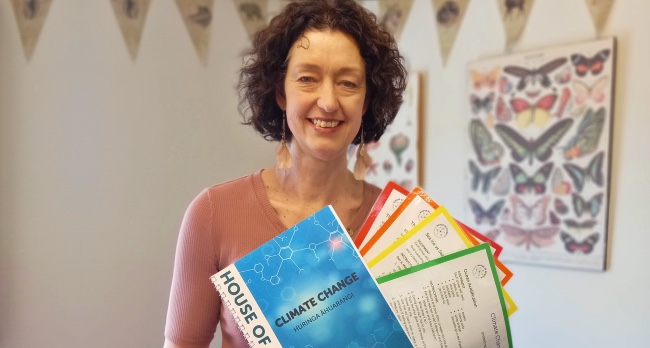Leased vehicles help the charity House of Science deliver hands-on science education to schools nationwide, explains founder Chris Duggan.
After 15 years teaching high school science, Chris Duggan was disturbed to learn that 73% of New Zealand primary schools had no science program. “I was horrified, to put it mildly, that we as a country allow that to happen,” she recalls.
Schools are not held accountable
Part of the problem is that schools are not held accountable for delivering the whole curriculum, which is an issue with the way education is done in New Zealand. That’s a policy issue, but Duggan saw a practical way she could contribute.
House of Science was born
Seeing the systemic issue, Duggan founded the charity House of Science in 2013 to empower teachers and provide resources to fill this gap. “The goal was to set up a charity to help primary and intermediate schools in the Western Bay of Plenty deliver better science lessons,” she explains.
Through visiting local schools, Duggan identified two main barriers – lack of teacher confidence and lack of resources. As generalists, most primary teachers hadn’t studied science extensively and felt “really quite nervous, almost scared” about teaching the subject, she notes. Even motivated teachers found it difficult and expensive to acquire engaging materials.
Science kits
Duggan’s solution was to develop a library of science kits that teachers could borrow, like a toy library. Each kit contains equipment and instructions to teach various science lessons to a class of 30 students. The charitably-funded kits immediately proved popular. “It’s a really well supported, complete wraparound service, and extremely popular,” Duggan says.
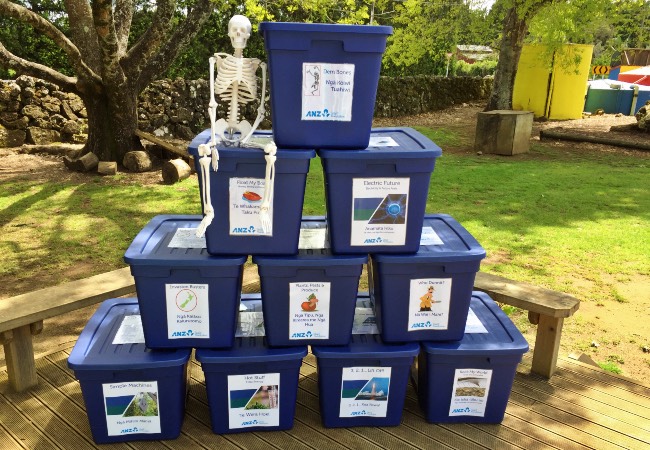
Word quickly spread and demand became nationwide, with satellite charities forming around New Zealand. Duggan now heads House of Science NZ, which consolidated the many independent charities under a national umbrella charity. They now deliver over 500 kits fortnightly to a third of all Kiwi schools, reaching 30,000 plus students per fortnight.
“These kits are the backbone of what we do,” affirms Duggan. The hands-on equipment and instructions aim to make science accessible for children from ages 5 to 13. Kits cover topics across the science curriculum, from physics to chemistry and biology. They are designed to spark curiosity and excite students through active, engaging experiments.
House of Science volunteers
Retirees constitute a large portion of the charity’s volunteers who handle kit delivery and maintenance. Many are former teachers keen to address the resource gap they experienced. With a door-to-door service model, volunteers ensure kits are returned fully restocked and ready for the next school.
Duggan credits this personalised approach with the program’s ongoing success. “That allows us to make sure that everything is back in the box before we take it back,” she explains. Self-delivery also provides oversight that would have been difficult to achieve if they had used couriers.
Teacher training
Housed in iconic blue fish bins, the science kits form the core of House of Science’s offerings. But Duggan shares they now receive government funding to provide additional teacher training as well. “We work directly in about a hundred schools to really support the teacher to become a leader in science,” she elaborates.
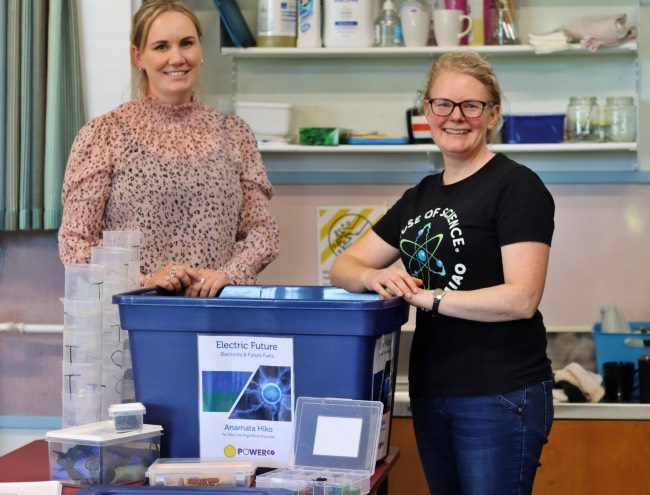
Measuring impact involves surveying teachers on student engagement and increased confidence. Duggan highlights external evaluations underway to quantify wider effects. “We’re very excited to see the report,” she says regarding an in-depth study on their educational and economic impact nationwide that is currently underway. The study aims to demonstrate the social return on investment that House of Science provides.
Supported by sponsors like OMV
While appreciating government teacher training support, Duggan notes no public funding goes towards the science kits themselves. She stresses that partnerships with sponsors are thus essential for House of Science to continue reaching Kiwi kids. Branding on their fleet of leased vehicles offers exposure for partners like OMV.
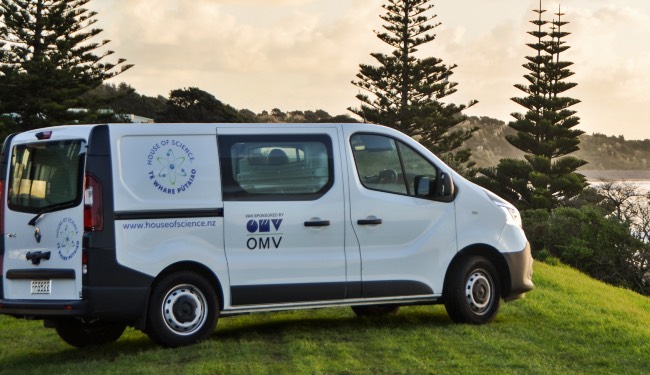
Leased vans and cars overcome logistical barriers
“A big part of what we do is reduce barriers for teachers, and one of the big barriers is accessing resources,” points out Duggan. She credits their leased vans and cars as critical for overcoming the logistical barriers of delivering kits across New Zealand. Their vehicles clock high mileage crisscrossing the country every week.
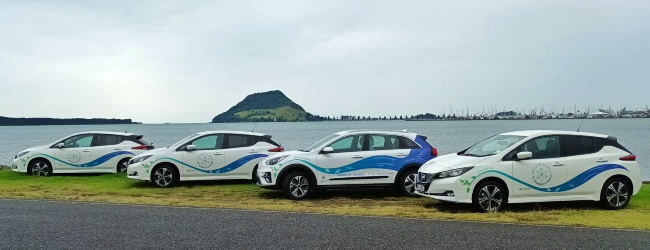
What Duggan likes about Driveline’s SmartLease
Longtime partner Driveline’s flexible leasing options have proven vital in keeping transportation costs down for the charity. “The fact that the Driveline leases are not serviced leases, makes them a lot more affordable,” shares Duggan.
With their vehicles racking up high mileage delivering science kits nationwide, a key factor for House of Science was finding a lease without mileage restrictions. “The other big drawcard for us was that there’s no mileage cap on [Driveline leases],” notes Duggan. “And I know that other leases are like that and they penalise you quite heavily when you go over, so that was not ever going to be an option for us.”
Duggan also wanted to avoid the steep refurbishment fees levied by other lease companies when vehicles are returned. Duggan affirms this was a major consideration, saying, “Yeah, we didn’t want that.” Driveline’s all-inclusive leases with no hidden end-of-term charges have proven the ideal fit for House of Science’s transportation needs and budget.
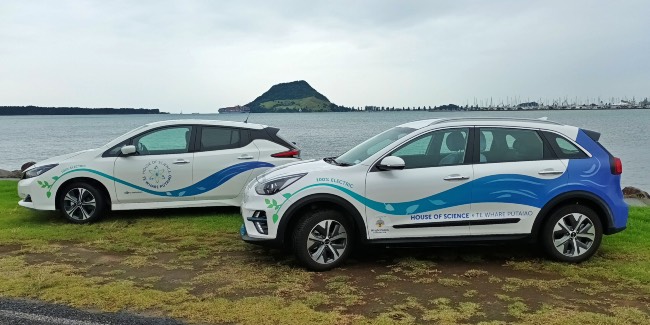
Rob Price takes the time to understand
She also appreciates the personalised relationship with Driveline business manager Rob Price. “Rob really understands our limitations, and our requirements,” notes Duggan. “The fact that we’re not locked into one particular vehicle gives us a lot of flexibility.”
Initially relying on volunteers’ vehicles, House of Science now runs a mixed fleet of 8 cars and 7 vans. Duggan highlights their recent move to electric vehicles, including Nissan Leafs and a BYD Atto 3. “As a science organisation, it’s a really good look for us,” she says. The EVs significantly reduce running costs for staff travelling widely to schools around the country.
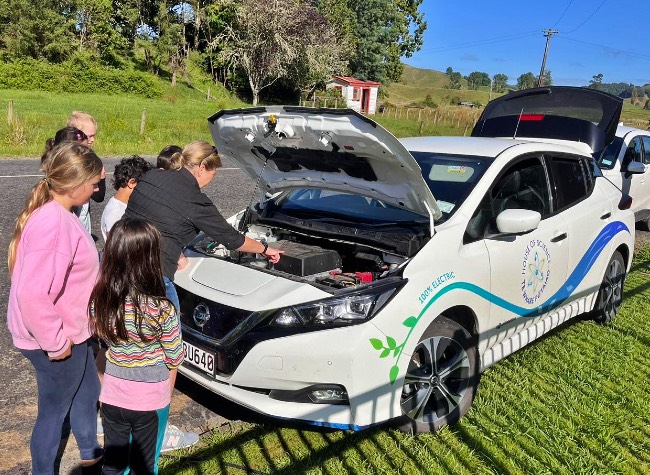
Critical thinking skills
Science kits and training aim to boost science literacy and critical thinking skills that Duggan sees as increasingly vital. She worries many Kiwi kids miss foundational science exposure and hands-on learning during primary school years. “If we’re not starting young, the kids are not going to be prepared,” she cautions.
Duggan left her teaching career with a vision to positively impact science education in New Zealand. A decade on, she expresses pride that House of Science has stayed true to its hands-on, teacher-focused model. They measure success by the growing number of schools and students reached.
But Duggan is looking forward to hearing anecdotes of children captivated by science through using their resources. “The longitudinal data will be really powerful,” she says of a current study interviewing past students on long-term effects.
Duggan hopes such stories will inspire the next generation of Kiwi scientists, reinforcing why making science fun and accessible matters. She believes sparking scientific curiosity and critical thinking at a young age shapes more informed, engaged citizens.
Empowering teachers to raise scientific literacy
Even as House of Science has evolved, Duggan says their core mission remains empowering teachers to deliver quality science education. “Our purpose is empowering teachers and we’re definitely doing that,” she affirms.
Looking ahead, Duggan aims to continue expanding their reach while staying true to their hands-on model. She notes that increased public awareness and advocacy around science education would help drive wider change.
“If we don’t start young, if we’re not doing quality science… then the kids are not going to be prepared for the future workforce,” stresses Duggan. “Scientific literacy, critical thinking, assessing what’s trustworthy… that’s really important to live a healthy life going forward.”
She believes House of Science plays a small but vital role in cultivating these skills in Kiwi kids. “We can help fill a gap and support teachers to actually deliver science,” says Duggan. Seeing the impact firsthand keeps her committed to this mission.
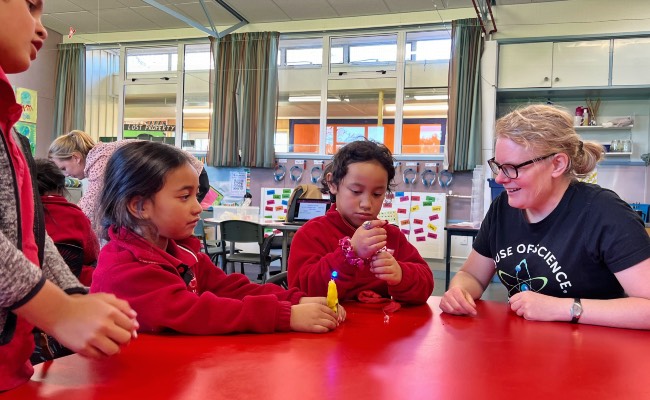
While system-wide change takes time, Duggan finds hope in the students touched by their programs. She delights in hearing stories of kids enchanted by a hands-on science lesson.
“The fact that we can get these resources to schools, and we can hear that love of learning from those students… that gives me energy to keep going,” Duggan shares.
